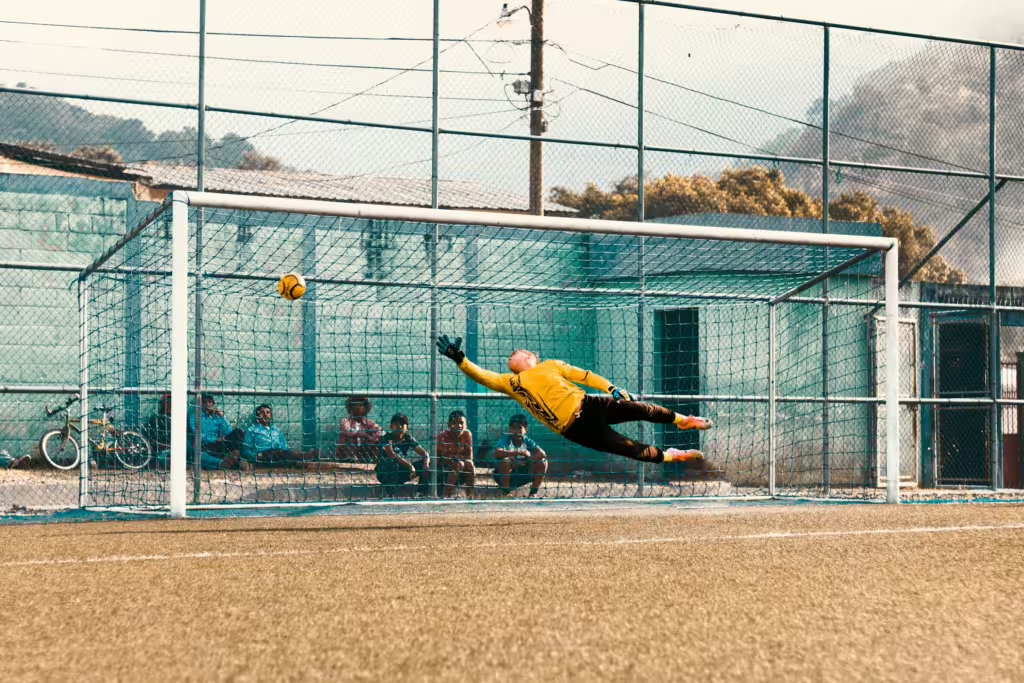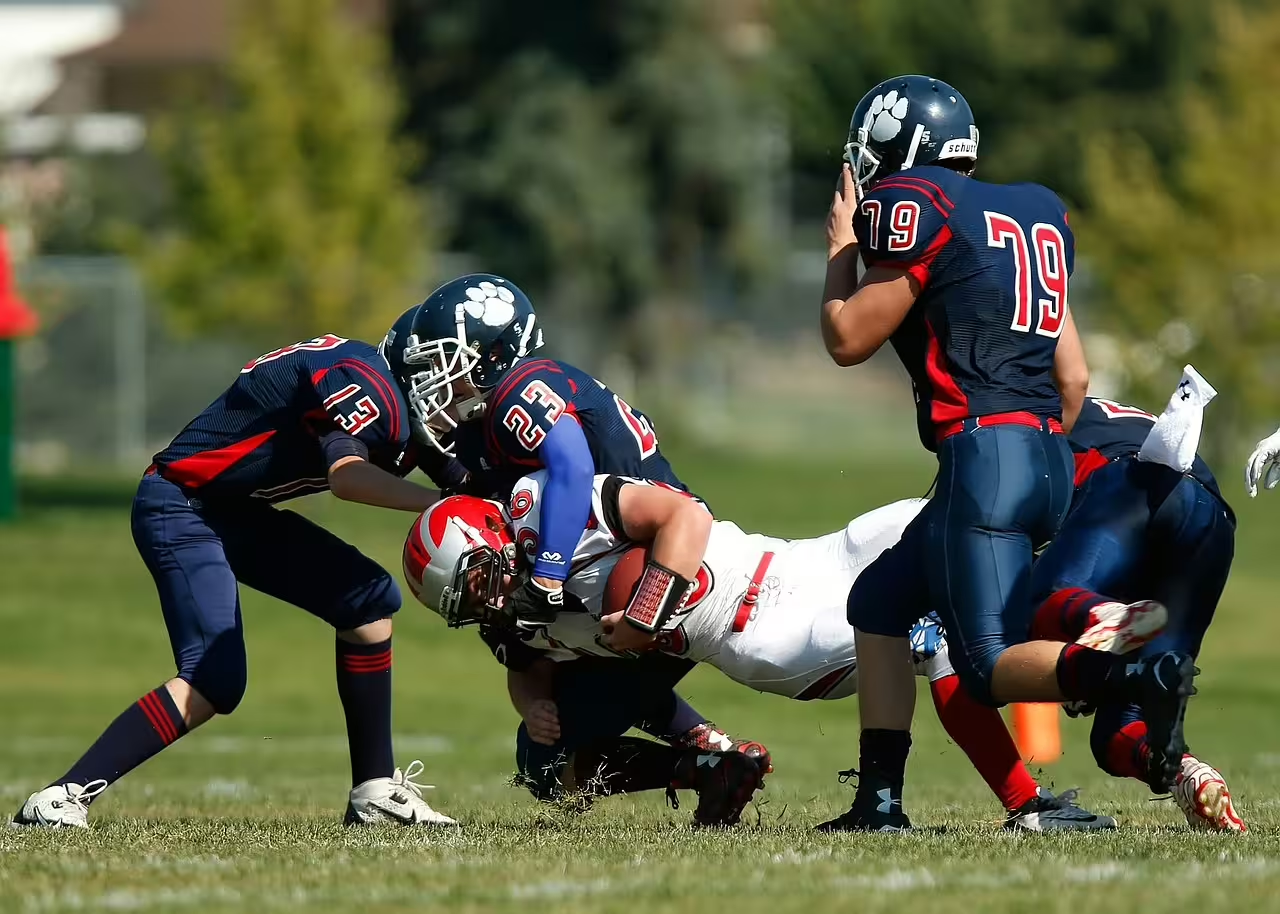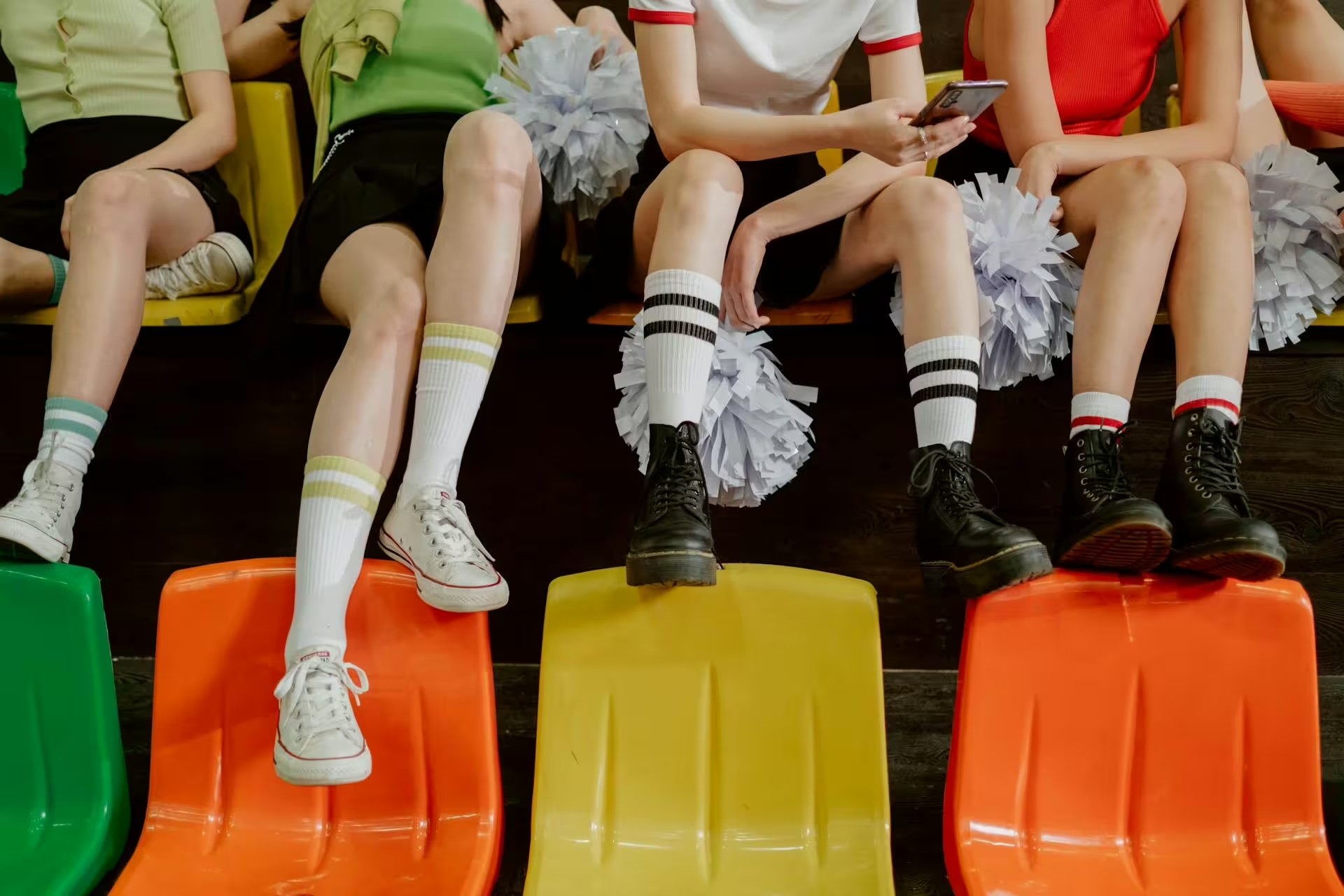It’s natural for children to feel shy now and then. Young children are only just beginning to experience the world and understand their place in it, so meeting new people and engaging in new experiences can be quite daunting, especially if there are others around. Think about the first time your child went to daycare or started preschool. Some children probably ran inside, heedless of any and all worries, while others clung to their parents leg, sobbing uncontrollably. Children who are starting sports for the first time might evince a similar reaction, but even of they aren’t terrified of the unknown, they might still be shy about meeting their coach and teammates.
Once they have gone over that particular hurdle, however, there might be more shyness in store. They might be nervous about performing in front of their new teammates or even playing in front of a crowd. Fortunately, there is something of a silver lining in all this. The fact is, sports can be a fantastic way to help boost a child’s confidence. Sports can help them face their fears, make new friends, and grants them an opportunity to show others what they are capable of! Trust us, once your child feels the exhilaration of hitting a home run in front of a crowd, all notions of shyness will follow the ball right into the outfield.
In this article, we will discuss the nature of building confidence in sports, both for experienced athletes and beginning players. We will explore how sports can help athletes grow stronger both mentally and physically. At the same time, we will examine how sports can help bring a child from shy to confident in the space of a season. Finally, we’ll share tips on how young athletes can get the most out of their sports journey.
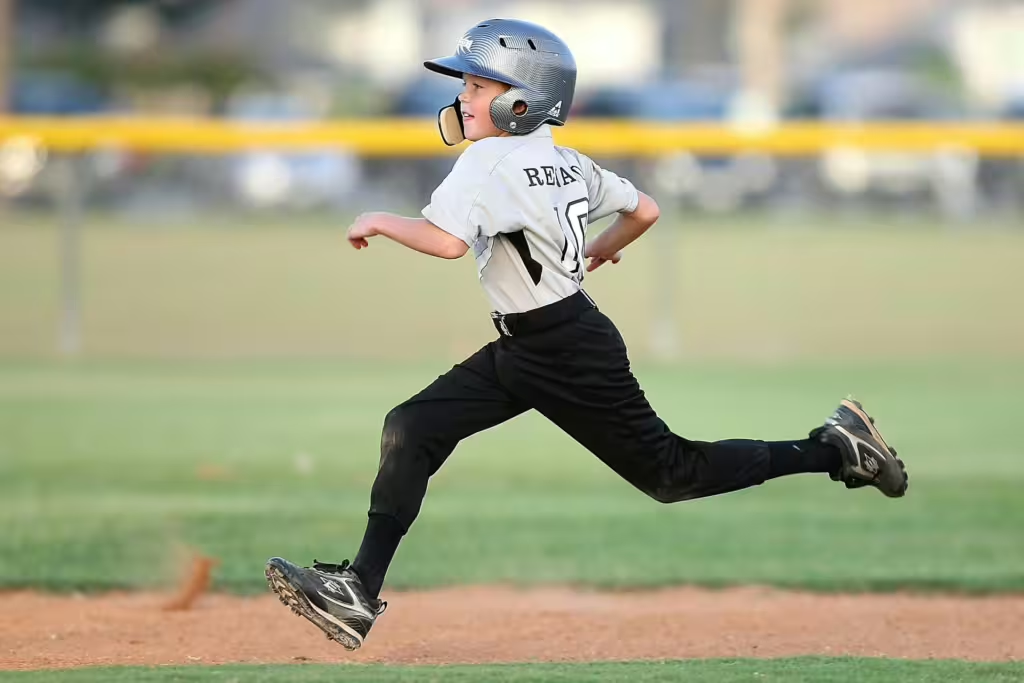
Why Confidence Matters
Self-confidence is important in sports, it helps a kid feel like they can accomplish their goals and have faith in their own abilities. It’s important to understand some things about confidence, however. First, confidence isn’t about being the loudest person in the room. It’s not about being so self-centered that you end up being pompous or mean. No, confidence is about believing in one’s own self, knowing one’s own strengths, and being comfortable with who you are as a person and as an athlete. Confidence helps kids to:
Tackle Challenges: When a child believes in themself, they become more willing to take on challenges and push past their own limits.
Stay Positive: Having fun in sports should always be the first thing that you or your child thinks of when setting up to play. That said, confident people are more likely to stay positive and have fun, while those who lack confidence might obsess over failures or let mistakes hold them back from enjoying the experience to the fullest.
Make Friends: It’s easier for kids to connect with their peers and their coaches when they feel comfortable in their own skin, and confident in their own abilities.
Succeed: Believing in yourself often leads to better performance, whether it’s on the field, in the classroom, or at home. The same is true for children, teens, and athletes in general.
Sports are a great way to help children build these qualities and make confidence a natural part of their growing personality.
How Sports Help Build Confidence
Playing sports teaches children important life lessons that contribute towards building self-confidence. Here are a few ways that they accomplish this:
Learning and Practicing New Skills
When a child start a new sport, it’s normal for them to feel unsure or even nervous about the experience. However, as they practice, they should start to improve and see themselves making meaningful progress. Whether it’s learning how to shoot a basketball, dribble a soccer ball, or perform a cartwheel, every small success adds to a young athletes’s confidence.
- Why It Helps: Each time a kid achieves one of their goals, they begin to realize that they are capable of more than they previously believed. This builds self-trust and encourages them to take on new challenges.
- Tip: Help your children to set small, achievable goals for themselves. For example, if they are learning to skateboard, have them start by balancing on the board before trying tricks. Finally, remember to celebrate each success, no matter how small!
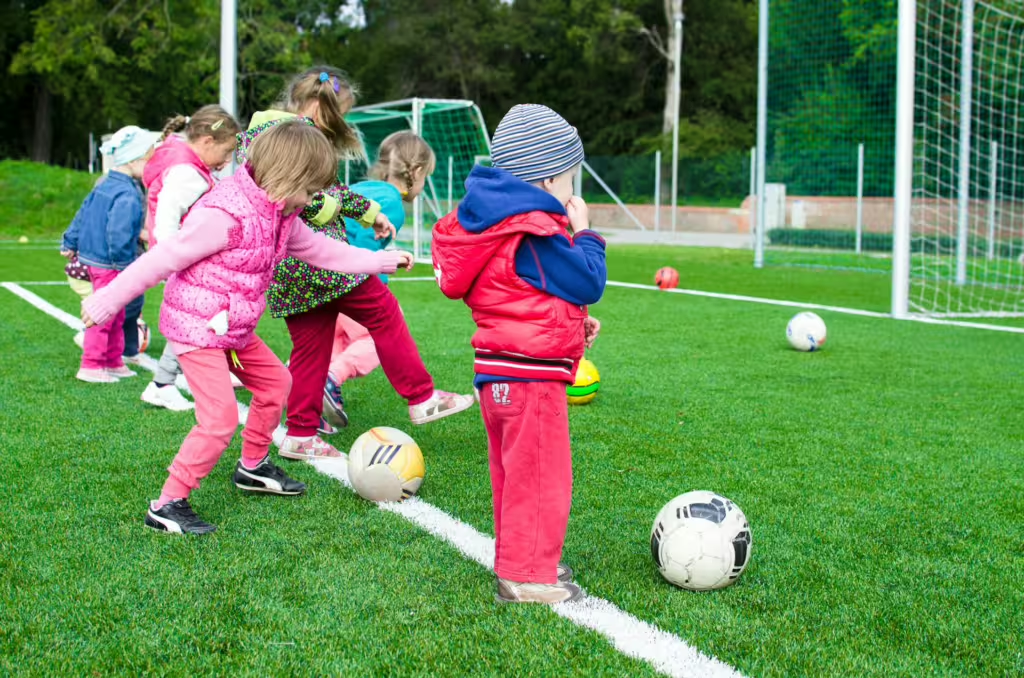
Getting Comfortable with Mistakes
Mistakes are as much a part of sports as sweating. Children who are playing a sport for the first time are bound to make some mistakes. They might miss a goal, strike out, or get tripped up during a race. The important thing to remember is that mistakes are a part of learning, and in sports, they’re both expected and accepted. Coaches and teammates can help in this regard as well, helping your child to see that mistakes are stepping stones to improvement.
- Why It Helps: Learning that it’s okay to make mistakes helps children to build resilience. At the same time, it reduces the fear of failure, which is a big factor in kids quitting sports.
- Tip: Instead of focusing on mistakes, have your child think about what they can learn from those mistakes. Help them to see that every mistake is a chance to improve and do better next time.
Developing Teamwork and Communication Skills
Many sports are team-based, which will give your child plenty of opportunities to work closely with others. Teammates learn to communicate, support each other, and work together, and all of these are essential for team success. This situation usually helps shy individuals come out of their shell as they learn to express themselves and rely on other people.
- Why It Helps: Being part of a team shows children the power of cooperation, and it’s a great way to make friends who can then offer support.
- Tip: Encourage your kids to fight their shy impulses and be open and friendly with their teammates. You can help by being open and communicative with other parents and coaches yourself. Teach kids to cheer others on or offer help to someone who might need it. You and your child might even find yourself surprised at how easily friendships form when you’re on a team.
Building Physical Strength and Endurance
As young athletes train and improve in their chosen area of sport, they also build physical strength and endurance. This growth can often leads to a sense of pride in their own abilities, which translates to mental strength and self-assurance.
- Why It Helps: Physical fitness boosts our mood, energy, and overall sense of well-being. When this happens to a child, it all contribute to them feeling more confident.
- Tip: Help your child to track their progress to see how much they improve over time. Whether they are running faster, lifting heavier, or perfecting a skill, each accomplishment adds to their sense of confidence.
Setting and Achieving Goals
We all know that a major part of sports is meeting one’s goals. Whether your kid is scoring points or completing personal bests, setting realistic goals is paramount to achieving success. By setting and achieving personal goals, kids learn the value of hard work, perseverance, and patience. Every goal reached, no matter how small, can be a real confidence booster.
- Why It Helps: Achieving goals, even minor ones, helps children to realize that they are capable of growth and success.
- Tip: Have your child set both short-term and long-term goals for themself, but help them to realize that some goals are realistic and some are not. For example, if your teen is a swimmer, have them aim to improve their time by a second this month, and maybe work toward a medal in the next season.
Learning to Cope with Winning and Losing
When it comes to sports, there are victories and there are defeats. Winning feels amazing, but sometimes losing can teach us more about ourselves. Losing helps children develop grace, patience, and determination to improve.
- Why It Helps: Learning to handle both success and setbacks gracefully builds inner strength and resilience in children
- Tip: After a game or competition, have your child think about what went well and what they can do to improve, rather than focusing on just the overall result.
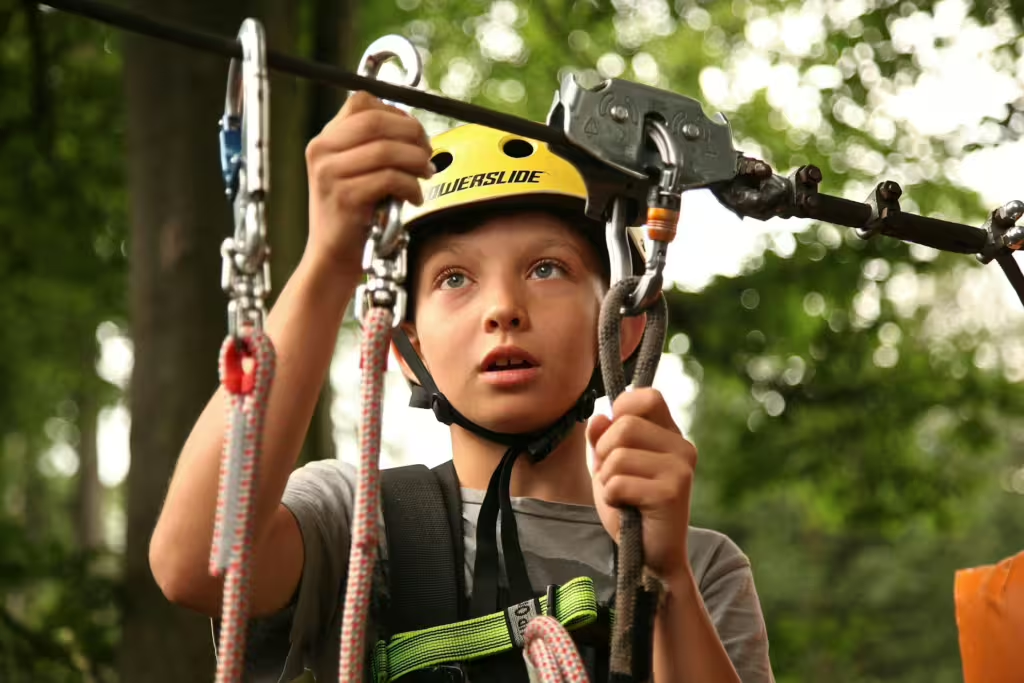
How to Build Confidence When You’re New to Sports
Starting out in sports can be intimidating for many young children, especially if they happen to notice that other kids seem more experienced or at east. In these instances, it’s important to remember that everyone was a beginner once! Parents can help remind their children of this by sharing their own early sports experiences. Here are some tips to help your child build confidence when they are just starting out.
Choose a Sport You Enjoy
The first step to building confidence is to help your child find a sport that they enjoy. When a child is interested and having fun, they are more likely to stick with it and push themself so that they improve.
- Why It Helps: When a kid is doing something they love, it keeps them motivated and makes them feel good about themself.
- Tip: Have your kid try out a few different sports until they find one that makes them feel excited. This could be a team sport, like basketball, hockey, or soccer, or an individual sport, like swimming, gymnastics, or skateboarding.
Start Small and Build Your Skills
Remind your child that there’s no rush to become a pro overnight. Confidence is the natural consequence of improvement, so have them focus on building one skill at a time.
- Why It Helps: Achieving small milestones gives children a quick win, while fostering a sense of accomplishment.
- Tip: If your child’s goals are a bit too lofty, break them down into smaller, achievable steps. For instance, if your child is learning soccer, have them start by mastering passing before moving on to advanced moves.
Practice Regularly
They are right about one thing: practice does make perfect. The more a child practices anything, the better they will become. Regular practice helps kids to feel more comfortable and in control, which boosts their confidence.
- Why It Helps: Consistent practice makes skills second nature, so the child feels more secure when playing.
- Tip: Set aside time each week to practice with your child. The key is consistency, even if it’s only a few minutes a day.
Surround Yourself with Positive People
Having a supportive team, coach, and family makes a big difference, especially to kids and teens. Encouraging words and constructive feedback help young athletes feel more confident and valued as they perform.
- Why It Helps: Positive people inspire young athletes, boost their mood, and build self-esteem.
- Tip: Have your child seek out teammates and friends who lift them up, and encourage them to be that person for others too.
Celebrate Your Progress
No achievement is too small to celebrate when it comes to building confidence in children. Cheer them on whenever you can and help them recognize and appreciate their own progress .
- Why It Helps: Celebrating small wins motivates kids to keep going and reminds them of how far they have come.
- Tip: Have your child keep a journal or list of their accomplishments. Have them write down things like “scored my first goal” or “ran my fastest mile.” Looking back at these moments can be a huge confidence booster.
Cultured Athlete Says…
As you can see, sports can be a powerful tool for helping children to build up confidence, make new and lasting friends, and develop life skills that go far beyond the sports field. As children practice, learn, and grow in their chosen sport, remind them that it’s okay to feel nervous or unsure at times along the way. Teach them that everyone starts somewhere and that the most important thing is to keep going, especially when things get tough. Don’t forget to celebrate their successes, and teach kids to be proud of each step they take.
Remember, confidence isn’t about being perfect; it’s about believing in yourself, even when things get tough. If your child tries their best, sets and completes their goals, and learns to work with others, they will inevitably discover strengths they never knew you had; they might even surprise you as well! So whether your kid is kicking a soccer ball, diving into a pool, or balancing on a beam, know that sports have the power to help them become their best, most confident version of themself!
Discover more from CulturedAthlete
Subscribe to get the latest posts sent to your email.

